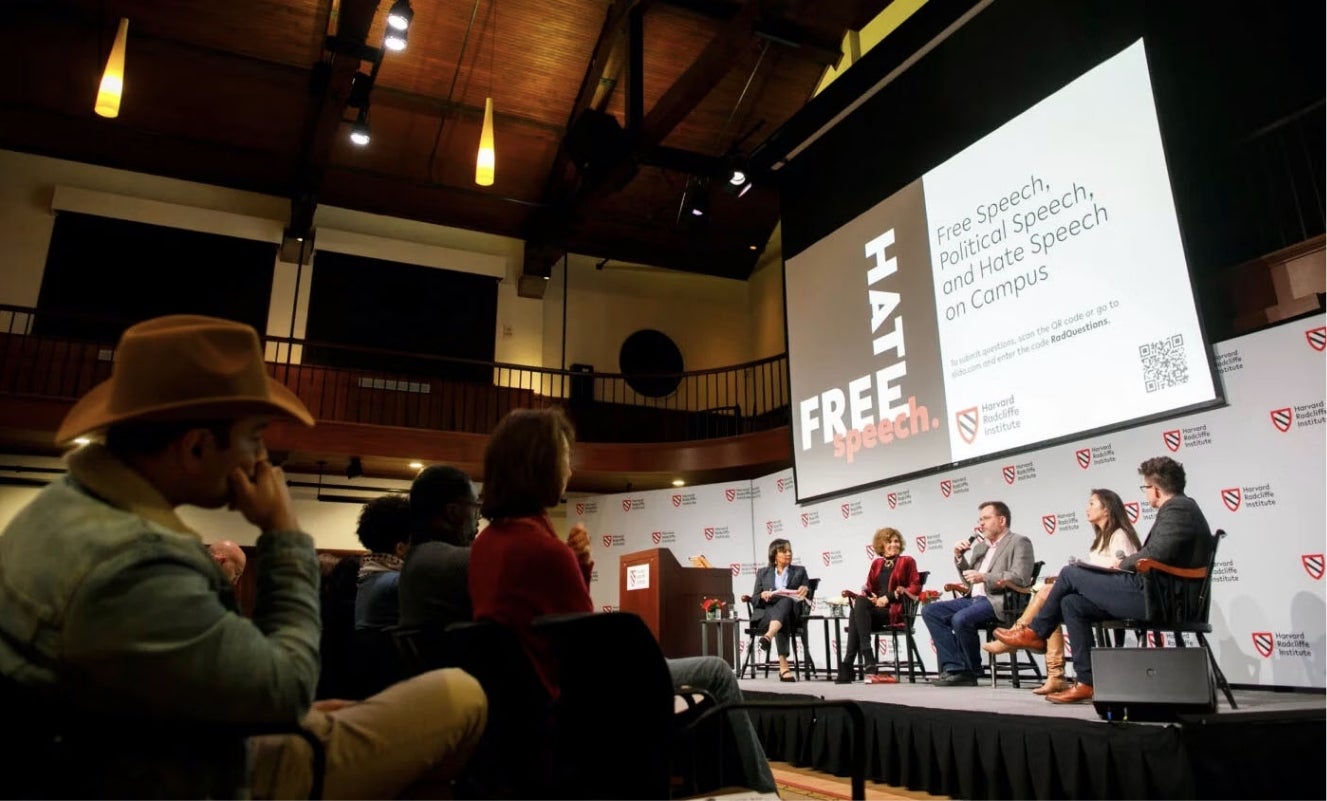In an era of heightened tensions on campuses and fierce debates on the role of higher education in our society, how can students and scholars engage constructively, even when they disagree passionately, in ways that bridge divides rather than widen them? At this moment, Harvard Radcliffe Institute (HRI) harkens back to the core principle animating its academic community and upholding the University’s mission: the freedom to teach, to learn, to explore, and to pursue research and enduring knowledge.
HRI—which is celebrating its 25th anniversary this year—has historically leaned into examining divisive issues, offering a model for communicating effectively across difference and building collaborations among diverse stakeholders. By necessity and design, HRI fosters an intellectual environment characterized by interdisciplinary exchange and civil discourse across a diversity of perspectives, ideologies, and expertise.
Philanthropic support for civil discourse from couples Susan Fales-Hill AB ’84 and Aaron Hill MBA ’89 and Lori E. Lesser AB ’88, JD ’93 and Daniel Shuchman directly supports this work and will catalyze the launch of a new focus area on Academic Freedom and Connecting Across Difference.
The three-year initiative will build on HRI’s strengths as a convener for intellectual exchange in both public and private fora. The new focus area will examine topics including political polarization, inequality, state regulation, and other policy issues that concern free inquiry in higher education. Funding will support opportunities for scholarly collaboration, conferences, lectures, seminars, workshops, and publications.
“I have followed and supported the work of the Radcliffe Institute since its inception, and it is an unrivaled incubator of talent,” says Fales-Hill, who is a member of the HRI Dean’s Advisory Council and the Schlesinger Library Council. “My husband, Aaron, and I have full faith in the vision of Dean Tomiko Brown-Nagin, and we believe in creating bridges across all divides as the only way to maintain a healthy society. We wanted to give a gift that would address a global issue and help to strengthen the University community we love. The fund for civil discourse offered the perfect opportunity to promote our core values—maintaining a healthy dialogue among diverse schools of thought, learning from our differences, and celebrating our common humanity.”

Lesser, who serves on the HRI Dean’s Advisory Council with Fales-Hill, and Shuchman, a former chair of the Foundation for Individual Rights and Expression who has written about these issues in the Wall Street Journal and elsewhere, are also supporting civil discourse efforts in the Faculty of Arts and Sciences (FAS) and across the University.
“We are excited to support Radcliffe’s fund for civil discourse and Radcliffe’s efforts to foster an ethos of thoughtful, constructive debate. This is one of several initiatives we are supporting across Harvard to enhance diversity of opinion, promote respectful dialogue on campus, and renew the quest for veritas,” say Lesser and Shuchman. “It is inspirational to observe the commitments of Radcliffe and the Harvard administration to improve the intellectual environment on campus.”
HRI has a long history of hosting public programming that invites people of different backgrounds to explore complex issues. “The Age of Roe: The Past, Present, and Future of Abortion in America,” a 2023 conference and accompanying exhibition from the Schlesinger Library, convened a broad array of scholars, clinicians, and activists to engage in respectful and serious discussions on the impact of Roe v. Wade, including in the post-Dobbs landscape. More recently, HRI hosted programming on timely topics such as “Free Speech, Political Speech, and Hate Speech on Campus” and “Institutional Neutrality in a Polarized World.” The increased focus on these topics aligns with similar efforts across the University.
This strong commitment to civil discourse is especially significant for HRI Dean Tomiko Brown-Nagin, Daniel P.S. Paul Professor of Constitutional Law at Harvard Law School and professor of history in the FAS. Brown-Nagin is co-chair of the University’s Open Inquiry Working Group, along with government professor Eric Beerbohm, senior advisor for civil discourse in the FAS and faculty director of the Edmond & Lily Safra Center for Ethics.
Charged with finding ways for Harvard to better nurture open inquiry and communication across multiple perspectives, the working group conducted surveys and held a series of listening sessions with community members across the University. In its recently released report, the working group shared it’s findings, along with recommendations and best practices on how to improve civil discourse at Harvard.
“The future of our society relies on our capacity to listen, understand, and learn from one another and to ask questions without fear,” Brown-Nagin says. “These values are meaningful to me. I’m thrilled that Radcliffe is helping to lead the way at the University, providing an incubator for research and programming that responds to the challenges of our time.”


